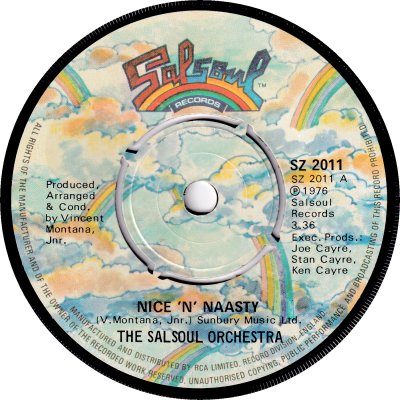
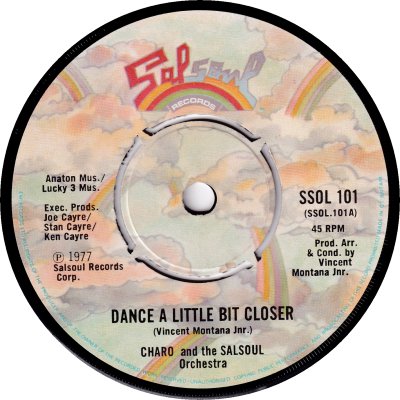
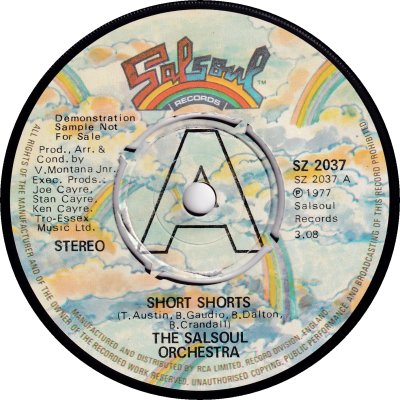
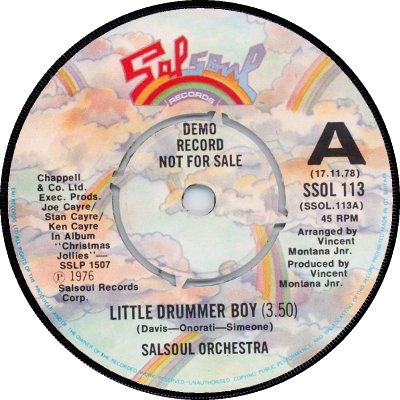
American, out of New York; an offshoot of the Caytronics Corporation. Caytronics was run by Joe Cayre, in association with his brothers Ken and Stanley. It started out in March 1966 as an importer and distributor of Latin American records into the USA but soon expanded its interests, moving into licensing and eventually running its own record labels. 'Billboard' of the 29th of July 1967 reported that the company had signed agreements with Columbia, Roulette and the ABC group to issue their Latin product on tape, and an advert in the issue of 23rd of March the following year was able to claim that Caytronics offered 'The largest and most complete supply of Latin-American music' on both the cassette and 8-track formats. 1972 was a busy year for the company: it signed a deal giving it the exclusive rights to distribute RCA's Latin line; it introduced the Mericana and Pronto labels, for licensed and original Latin records; it planned to extend its reach so that it had branches in Los Angeles, San Antonio, Chicago, Miami and New York ('BB', 16th September); and it proposed a monthly hour-long TV special showcasing artists on labels that it owned or distributed. The programme was to be called 'Caytronics Presents' and was intended to appear on UHF-Channel 47 ('BB', 22nd September). Whether it got off the ground or not isn't reported online.
1973 brought a problem, in the shape of the world-wide vinyl shortage. Caytronics had to cut back on the numbers of records that it issued and the number that it pressed; one new label, 'Nor-Mex', was stopped in its tracks after a few issues, and another, Soulsa, had to be abandoned entirely ('BB', 17th November). The year after, however, the shortage eased and Caytronics was able to give a proper launch to a new label: Salsoul. According to Tim Lawrence in his book 'Love Saves The Day: A History Of American Dance Music Culture 1970-70' the Mericana LP 'Salsoul' by Joe Bataan proved a runaway success and prompted Columbia Records to acquire the rights to distribute it and any future Mericana product. They paid $100,000 for the privilege, and the money enabled Caytronics to launch Salsoul, which took its name from the Bataan LP. Its first single, 'The Bottle' b/w 'When You're Down' by Bataan (SS-8701) came out in the States in December. According to a 'BB' retrospective (1st of January 1977) Ken Cayre had the idea of blending Latino and R&B together and adding lush arrangements typical of Philadelphia Soul productions, and it was this which was to give Salsoul records their distinctive sound. The timing was right, as the Disco boom was on the horizon. As the retrospective observed, the first issue by The Salsoul Orchestra was successful and it prompted the company to expand its efforts in that area. In addition there came a stroke of inspiration. Noting that dancers often wanted the long versions of records that they heard in clubs but could only get the short versions on 7" singles, Salsoul's management introduced the first commercially-available 12" single, in May 1976 ('BB', 2nd October 1976) - 12" singles had been around previously but had only been available to DJs. The single, offering two different Disco mixes of 'Ten Per Cent' by Double Exposure (12D-2008) hit the Charts, and the idea caught on.
Having hit the sweet spot, Salsoul flourished. 'BB' of the 2nd of October 1976 described it as 'One of the most formidable forces in the music industry today', and the following week's issue announced that it had tied with Casablanca for the title of 'Disco Label Of The Year' at the magazine's second International Disco Forum ('BB', 9th October). At the forum Joe Cayre outlined plans for a series of worldwide franchised Salsoul discotheques, but 'BB' of the 16th of October said that the plans had been shelved and that the company was to concentrate on developing and expanding its record business. There must have been a slight dip the following year, as 'BB' of the 28th of January quoted a company spokesman as saying that it was attempting a Disco Awareness campaign in an effort to raise sales and get Salsoul back to its position as the Number One Disco label. He added that some 'negativism' had been noticed, and as a result the word 'Disco' was to be replaced by 'Music for special markets'. In addition there were to be fewer commercial 12" singles released. Alongside all its Disco activity Caytronics continued to take care of its Latin side: 'BB' of the 21st of January 1978 commented that the company was still 'Undisputed leader in the Latin US music industry'. In 'BB' of the 11th of February vice president and general manager Chuck Gregory confirmed that there was to be a change of emphasis. After crediting The Bee Gees and 'Saturday Night Fever' for opening doors for Salsoul he went on to state that in future the label would be concentrating on material which would cross over into the Pop and R&B fields.
The distancing from Disco music proved to be prescient. Despite 'BB' of the 10th of March 1979 reporting that record companies were upping their involvement in the genre a backlash was not far away. The summer of that year saw the birth of a 'Disco Sucks' movement, and from that point into the early '80s the popularity of Disco ebbed away. 'BB' of the 2nd of March 1980 observed that under the guidance of new president Dick Carter, previously with RCA, Salsoul now had no Disco artists left on its roster, which had been pruned, and was concentrating on R&B instead. The release schedule continued to he busy until the end of 1983 but it slowed down and finally stopped at the end of 1984. Parent company Caytronics kept on with the Latin side of things, including dubbing videos of films into Spanish; they also entered the 'blank tape' market ('BB', 24th July 1982). There must have been a downturn in their fortunes, however, as in 'BB' of the 15th of January 1986 Joe Cayre was outlining a 'survival strategy' which included branching into Children's and Tropical music and making MTV-style programmes for Spanish television.
In Britain, Salsoul failed to make anything like the impression that it had done in the States. It managed only four Chart singles, none of which broke into the Top 40; the highest placing was a No.44, achieved by 'Dance A Little Closer' b/w 'Cuchi-Cuchi' by Charo & The Salsoul Orchestra (SSOL-101; 3/78). The first Salsoul product appeared on RCA, which put out two singles by Joe Bataan, one in March 1975, the other two months later. Four singles on CBS's Epic label followed, from October 1975 to April 1976, three by The Salsoul Orchestra and one by Carol Williams. Salsoul finally made its debut here as a label in November 1976. 'Music Week' of the 16th of October said that a licensing deal with RCA had been signed, and a month or so later 'MW' of the 27th of November told its readers that Salsoul had been started by Joe Cayre in order to capitalize on the popularity in the USA of a hybrid of Latin-American Salsa and Soul. That issue added that the deal with RCA also covered material on Salsoul offshoot Gold Mind, whose artists included Love Committee and Loleatta Holloway.
After some fifteen months without Singles Chart action Salsoul moved to EMI, as noted by 'MW' of the 4th of February 1978. It came under the wing of EMI's Licensed Record Division and remained there until the agreement with EMI ceased, the final EMI Salsoul single coming out in March 1979. It was during the EMI period that the label scored its four Chart entries. The spring of 1980 saw Salsoul back at RCA, where it stayed for some six months. After licensing three singles to the Excaliber label - one of them, 'Jingo' b/w 'Dancin' And Prancin' by Candido (EXC-102; 6/81) reached No.55 in the Charts - it returned to RCA in December 1982; records by the band New York Skyy came out on Epic from December 1981 to July 1983, presumably under a separate licensing arrangement. Salsoul issued its final record at the end of 1984, but was to enjoy a renaissance in the mid 1990s when The Right Stuff licensed its master recordings and began a series of reissues.
One label design served Salsoul throughout the '70s, though the colours became warmer after the move from RCA (1) to EMI (2) and there were changes in the position of various credits. In addition promo copies were marked differently during the RCA (3) and EMI (4) eras, the markings following the usual style of the licensing companies. The catalogue numbers changed at the time of the move. RCA Salsouls generally had the same SZ-2000 numbers as their American counterparts; if there was no American equivalent the single was given a new number in that same series. EMI Salsouls were numbered in the SSOL-100s. As the licensers, first RCA and then EMI handled pressing, sales and distribution. Sadly there were no 7" company sleeves, although 12" singles had them. The discography below only covers the 1970s.
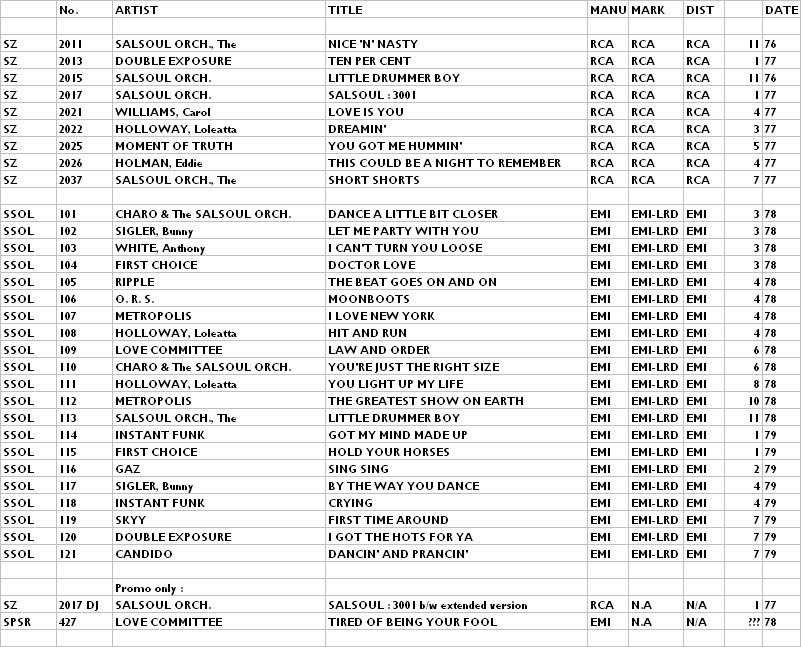


Copyright 2006 Robert Lyons.

